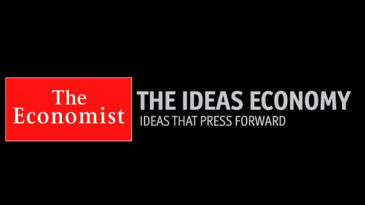Dispatch from the Ideas Economy

The Economist hosted its “Ideas Economy” event this week at the Berkeley Haas School of Business to talk about disruptive technologies, entrepreneurship, and economic growth. The focus of the event was innovation, but the conversation ranged from neuroscience to 3D-printed meat, and everything in between.
A common chord struck amongst the prolific minds that took the stage was the impact of exponentially increasing technologies and the disruption it will have in the coming years. Executive Editor of The Economist Daniel Franklin started off the event by forecasting some “megatrends” he envisions taking place in the next 30 years. He projects big paradigm shifts will take place within the education and banking systems (aggregation of universities with an emphasis on individualized, interactive learning; and finance merging with big data – suggesting Google would own Goldman Sachs by 2035).
Franklin believes it will be bottom-up, entrepreneurially-led innovation that will give rise to the solutions capable of assuaging the world’s current woes like energy, health care, etc. Although his hypothetical scenarios were generally optimistic, he conceded that black swans like the latest recession will become increasingly more common as the double-edged sword of technology will also bring forth greater volatility.
The rest of the conference’s speakers was an eclectic group of game changers excelling in their specific focus. We heard from über CEOs, all-star academics, futurists, philosophers, and even a representative of Burning Man. The wide range of speakers and attendees prompted great interdisciplinary conversation and illustrated the importance of big picture thinking and collaboration. As such, the conference on innovation turned into a microcosm of innovation; connections and collaboration between individuals of every background and degrees of expertise, the Ideas Economy felt like a Renaissance 2.0 convention. But despite the amazing ideas and technologies discussed, there was one missing piece to the puzzle of disruptive innovation that went unmentioned: the role of government.
Being that this was an event run by the Economist, the curators tried to provide a cosmopolitan perspective of innovation. This was manifested through the conference’s final session: a debate on the innovation race between the US and China. Though this made for a heated and entertaining hour, it missed some bigger questions that are becoming more and more pertinent.
Firstly, the entire notion of the US competing with China is not the most productive way to think about innovation. Competition is a driving force of innovation, but collaboration is the crux of it; and remains something – especially on a global scale – in need of an upgrade. We can surely learn things by analyzing what has been working where, but the question moving forward should be more along the lines of how do we ignite more global cooperation to bolster innovation? Whether it is through government or not, unbounded collaboration is paramount for planetary prosperity.
Next, with all of the rapid innovation taking place around the world, and the state of exponentially increasing technologies, how is government going to catch up? The US government’s framework is specifically designed to thwart quick decision making. The system of checks and balances was a marvelous invention at its outset but is totally antiquated with the insight and resources we have today. While scientists recently concluded that people aren’t smart enough for democracy to flourish, there is no reason to throw the entire model out the window as “government of the people, for the people, by the people” is still a strong ethos for a ruling system. However, in the coming years we will need to reevaluate many long held traditions and equip ourselves to be able to take decisive action on events that we can’t yet imagine, nonetheless prepare for.
The world is in this awkward transitionary period between the traditionally-held, Lockean state of affairs and the digital, technological state of affairs. Laws surrounding cybercrime, internet transparency, and morality are all on the table. With the rise of synthetic biology we may soon need to reevaluate what it means to be human. Can a paraplegic race in the olympics? The lines surrounding property rights will need to be redrawn. Can I sell my pair of 3D-printed Nikes on ebay? Neuroscientists like David Eagleman are actively in favor of bringing fMRI results into the courtroom. Is a murderer with a tumor in his brain fully responsible for his actions? These ideas are pertinent and foreign to the system we have in place, one that has enough trouble just trying to figure out its budget.
Technology is speeding up, whether our governmental systems can adapt and handle the growing responsibility is still unknown. We stand at a significant inflection point in our history, where technology is at a level where we can proactively create Sci-Fi-like movie conditions in our actual reality. Call it Sci-Non-Fi, or whatever you’d like, but things are about to get weird. And it is up to us, as empowered individuals, to make sure that our story is not the dystopian one popularized in cinema. A strong governing force can, at its best, be the backbone for a fruitfully livelihood for all and steer mankind forward. Innovation, however, is a bottom-up phenomenon; and it is essential that our governments recognize this in addition to the accelerating times we live in and adapt to find its appropriate role in the equation, so it can promote sustainable prosperity rather than hinder it. It’s time we take a fresh look at the existing paradigm and ask ourselves, what should be the role of government in 2012 and beyond?





